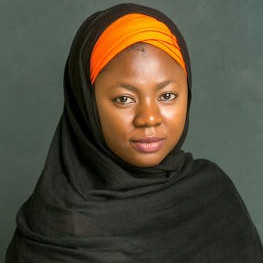Fatima Madaki Abubakar
Biography Narrative
Founder, Education & Sustainable Livelihood Youth Initiative
Fatima Madaki has more than 12 years of experience in a multi-organizational context, with partners, stakeholders and clients in the area of youth, education, gender, leadership, economic empowerment, peacebuilding, conflict management and research. She currently works with Search for Common Ground Nigeria as a senior project coordinator, implementing and managing peacebuilding programs in the Northeast region of Nigeria focusing on human rights. She previously managed the project, ‘Building Consensus on the Protection of Holy Sites,’ an interfaith peacebuilding project promoting the protection of holy sites from destruction and desecration in northern Nigeria.
Fatima is the founder of the Education & Sustainable Livelihood Youth Initiative (ESLYI), a not-for-profit organization that promotes youth engagement in peacebuilding, education, and enterprise development. Her interests are in supporting women-led peace initiatives to promote religious tolerance, inclusion and social cohesion through dialogue, field visits, conferences and seminars. She holds a bachelor’s degree in psychology, a certificate in civic leadership from Rutgers University, New Jersey, and is a Fellow of the United States Institute of Peace (USIP) Generation Change Program. She believes that building a network of empowered citizens would transform systems and societies through leadership and enterprise with an emphasis on developing capacity in strategic analysis, planning, program development, implementation and management for early stage leaders, social enterprises and those looking to grow.
Fatima strongly believes in collaborative action and providing a safe space for dialogue and interaction in such a way that dignifies everyone, thus… “What I know for sure is that speaking your truth is the absolute tool that you have for sure” – Oprah Winfrey and “Try to open the space to hear the truth even if it is depressing and cynical” – Amina Mohammed, Deputy Secretary General of the United Nations.
Interreligious Activities and Initiatives
Enhancing IRD and SDG’s Youth Engagement

